Kenneth L. Gentry Jr.'s Blog, page 41
December 10, 2021
GRADUAL VICTORY IN THE NT
 PMW 2021-089 by Kenneth L. Gentry, Jr.
PMW 2021-089 by Kenneth L. Gentry, Jr.
A reader has sent me a very perceptive email that well deserves my attention. And I think answering it will prove valuable to you in your postmillennial study as I engage the question it presents. He writes:
“Reflecting on Isaiah 11 —— ‘The Peaceable Kingdom.’ If we take that to be a portrait of the ‘post-millennial’ millennium, then I would find its New Testament counterpart in Romans 8 (redemption of all creation).
But — here’s the question — apart from 1 Corinthians 15 (‘and he must reign…’) and The Parable of the Mustard Seed and leaven in the lump, I see very little in the New Testament itself which seems to envision the slow growth of the kingdom resulting in a victorious display within an historic millennium.
I don’t, for example, see anything in the Pauline corpus (or other NT letters) which looks forward to ‘the Peaceable Kingdom’ within history, no references or allusions in the NT to Isaiah 11 and others like it (e.g., Isaiah 35) as developing within history (other than the historical earthly ministry of Jesus himself).
It seems to me that the predominant mood in the NT is ‘the eager expectation’, waiting for ‘the appearing of our great God and Savior’, and the hope for ‘the glory that is yet to be revealed…’
Sounds rather ‘sudden’ (not gradual) to me.”
Now, for my reply.
Thanks for your inquiry. It shows deep thought and strongly biblical concerns. As I read your inquiry I see your major concern as one which is being fed by four subsidiary questions. Your main concern appears to be that the NT does not seem to expect a gradual development of peace on earth as a consequence of Christ’s kingdom Rather it apparently looks to a sudden coming of kingdom victory at the end of history when the consummate order is established.
In answering your concern, I will first highlight these sub-questions. Then having these out front, I will answer your concerns in the course of a several-part study. In doing so I hope to show that postmillennialism is not undermined by this major question with its inter-related matters.
The Underlying Concerns
As I read this inquiry, it seems that the subsidiary concerns underlying your main question are:
1. Does Isa 11 find its counterpart in Rom 8 and the redemption of all creation? That is, does it find its fulfillment in the consummate order rather than in the temporal order to unfold before Christ’s second advent?
2. Does the NT see the peaceable kingdom imagery (such as found in Isa 11 and 35) occurring prior to Christ’s return in glory?
3. Does the NT envision slow growth for this kingdom?
4. Does not the NT call us to expect God’s kingdom to appear suddenly?
The relationship of Isa 11 and Rom 8
Most evangelicals agree that Isa 11 is a Messianic prophecy, not one that pictures Hezekiah’s reign or some other OT-era fulfillment. I will work on this Messianic assumption, which is obviously the conviction of my inquirer.
In this prophecy Isaiah presents Christ as arising from the reduction of the Davidic line to a stump (Isa 11:1). And it promises that he will bring righteous judgment for the poor and the afflicted (Isa 11:4a). Then it sees this as resulting in a world in which the wolf, leopard, and lion will dwell peaceably with the lamb, goat and calf. Which being interpreted means: he sees Christ’s rule as judging righteously even for the poor of the world (who are so often oppressed by the wealthy rulers, cp. Isa 1:23; 5:23; 10:2) and as bringing peace to in its wake (as pictured by the loss of the natural enmity between carnivores and herbivores).
Furthermore, all evangelicals would agree that Paul’s teaching on the consummate order — our final estate in the new heavens and new earth — is the ultimate fulfillment of Isaiah’s peaceable kingdom prophecy. When Christ returns to end history and establish the final order, sin will be banished and perfect holiness and righteous will remain forevermore.
And as my inquirer surmises, Rom 8:18–25 does speak of the coming final, perfect order. This renewed order comes as a consequence of the future resurrection, which effects the redemption of the body and its final release from sin (Rom 8:23). And I as a postmillennialist agree with this, as well.
Three Views on the Millennium and Beyond
(ed. by Darrell Bock)
Presents three views on the millennium: progressive dispensationalist, amillennialist, and reconstructionist postmillennialist viewpoints. Includes separate responses to each view.
See more study materials at: www.KennethGentry.com
But before I engage the possible negative implications of Rom 8 for postmillennial gradualism (i.e., the slow progress of Christ’s kingdom to victory in history), I would like to offer a brief analysis of the relevant portion of Isa 11. Postmillennialists recognize and can account for the catastrophic language of the suddenness of Christ’s rule, despite its looking like it comes in a moment at the end, rather than developing slowly over time.
Reflections on Isa 11 itself
The prophetic narrative of Isa 11 follows upon that presented in Isa 10. In that chapter God is speaking of Assyria (Isa 10:5, 12, 24). And he is promising Israel that he will destroy this evil oppressor. The language he uses in the final words of his prophecy serve as a segue into our “peaceable kingdom” prophecy in Isa 11. For in Isa 10:33–34 Assyria’s judgment is pictured as a cutting down of a lofty tree. And in the prophecy It is cut down “by the Mighty One,” and that is it. Assyria is to be destroyed.
However, when we enter Isa 11 Isaiah reflects on Israel’s dire circumstances that have resulted from Assyria’s oppression: her glorious Davidic line has been reduced to a stump, virtually cut down to its roots. Yet this is not Israel’s final death knell. The prophecy does not end with the stump; in fact, it starts there.
Though David’s kingly line has been cut down to the root, it will spring forth anew. Isaiah puts it thus: “Then a shoot will spring from the stem of Jesse, / And a branch from his roots will bear fruit” (Isa 11:1). This, of course, is a Messianic prophecy that speaks of Christ’s coming in the first century.
As a result of the renewal of Jesse’s line in the Branch (Christ), justice will prevail (Isa 11:3–4a) because righteousness will characterize him (Isa 11:5). And peace will be effected among natural enemies (Isa 11:6–8) so that “they will not hurt or destroy in all My holy mountain, / For the earth will be full of the knowledge of the LORD / As the waters cover the sea” (Isa 11:9).
He Shall Have Dominion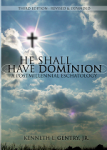
(paperback by Kenneth Gentry)
A classic, thorough explanation and defense of postmillennialism (600+ pages). Complete with several chapters answering specific objections.
See more study materials at: www.KennethGentry.com
But now what about the matter of a catastrophic coming as over against postmillennialism’s gradualistic development? After all, does not the prophecy add this catastrophic note: “He will strike the earth with the rod of His mouth, / And with the breath of His lips He will slay the wicked” (Isa 11:4b)? This sounds like the sudden coming of Christ at the second advent wherein he brings in the perfect, peaceful, perpetual order. How can this speak of slow, unfolding progress over time?
I would note that this prophecy clearly has gradualism built into it. We may see that on at least two lines of evidence. (1) As the prophecy opens Israel is lying in destruction and despair under the dominion of Assyria. Yet Isaiah promises her that God will renew the stump-stem of Jesse. This promised renewal speaks of the future (first century) coming of Christ several hundred years later. Thus, this prophecy is not fulfilled all at once and catastrophically for the people who originally hear it as a word of encouragement. (2) The language of the prophecy in Isa 11:1 suggests gradualism. It speaks of a root branch that “will bear fruit.” And fruit production from a felled tree naturally takes time.
But what of the statement about his striking the earth and slaying the wicked (Isa 11:4)? The dramatic destruction pictured here speaks of its certainty rather than its suddenness. The just order Christ brings in will have power and will gain the victory. Mighty Assyria exercised power by the sword, but the Branch of Jesse has such power that he can destroy with the mere breath of his mouth, i.e., by his mere word. Christ’s kingdom does not need sharp arrows, bent bows, flint-like hooves of horses, or chariot wheels like a whirlwind (Isa 5:28).
In the dramatic image of Isa 11:4b the prophet is not concerned with the question of the development or timing of Christ’s kingdom, but with the certainty of its victory — whenever and however it does come. He is comparing and contrasting the present status of the Davidic line with its future glory. As Hengstenberg puts it: “Before those who were filled with cares and fears lest the Davidic Kingdom should be overturned by the Assyrian kingdom, he holds up the bright image of the Kingdom of David, in its last completion” (Christology of the Old Testament, 1:458).
In this comparison he holds up the great glory of Christ’s kingdom as he pictures it in its earthly fulness. Though this is not emphasized in this passage (such is not Isaiah’s concern), postmillennialists believe that this comes gradually over time, like fruit slowly growing up out of felled tree’s root.
December 7, 2021
“YOU WILL BE HATED BY ALL MEN”?
 PMW 202-088 by Kenneth L. Gentry, Jr.
PMW 202-088 by Kenneth L. Gentry, Jr.
Oftentimes critics of postmillennialism will go to NT passages such as Matt 10:22 to discredit postmillennialism’s long-term optimism. That passage reads:
“You will be hated by all because of My name, but it is the one who has endured to the end who will be saved.”
Since postmillennialism expects a future in which Christianity reigns supreme, and in which righteousness and peace will prevail throughout the world, texts such as this one must be explained. Postmillennialism cannot be true if Christians will always be hated and the only hope we have is our bare endurance.
But does this passage teach such? I do not believe that it does. We must read the verse in its context to grasp what our Lord is actually declaring.
Postmillennialism Made Easy (by Ken Gentry)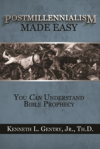
Basic introduction to postmillennialism. Presents the essence of the postmillennial argument and answers the leading objections. And all in a succinct, introductory fashion.
See more study materials at: www.KennethGentry.com
In Matt 10 Jesus appoints his disciples as apostles, investing them with great authority (Matt 10:1–2). And at this stage of his ministry he limits their outreach to Israel alone: “These twelve Jesus sent out after instructing them: ‘Do not go in the way of the Gentiles, and do not enter any city of the Samaritans; but rather go to the lost sheep of the house of Israel’” (Matt 10:5–6). Of course, this is not the way it was always to be, for later at the end of his ministry he commissions his church to “make disciples of all the nations” (Matt 28:19).
Furthermore, immediately after his limiting their mission to Israel, he teaches them what they are to preach: “And as you go, preach, saying, ‘The kingdom of heaven is at hand’” (Matt 10:7). This also shows the early phase of his ministry. The kingdom has not yet come, though it is close at hand.
He then directs them to go from city-to-city in Israel to preach the gospel, heal the sick, cast out demons, and so forth (Matt 10:8–15). He notes that he is sending them “as sheep in the midst of wolves” (Matt 10:16). And in doing so he warns them: “But beware of men, for they will hand you over to the courts and scourge you in their synagogues; and you will even be brought before governors and kings for My sake, as a testimony to them and to the Gentiles” (Matt 10:17–18). This clearly speaks of their ministry to Israel, for it mentions the trouble they will experience from the synagogues.
He further warns that “brother will betray brother to death, and a father his child; and children will rise up against parents and cause them to be put to death” (Matt 10:21). Then we read the verse that raised our question: “You will be hated by all because of My name, but it is the one who has endured to the end who will be saved” (Matt 10:22).
Then following this warning he promises: “But whenever they persecute you in one city, flee to the next; for truly I say to you, you will not finish going through the cities of Israel until the Son of Man comes” (Matt 10:23). We must ask: “Whenever who persecutes you?” Contextually, it is speaking expressly of Jewish opposition.
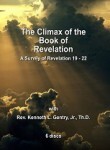
The Climax of the Book of Revelation (Rev 19-22)
Six lectures on six DVDs that introduce Revelation as a whole, then focuses on its glorious conclusion. Provides an important, lengthy Introduction to Revelation also.
See more study materials at: www.KennethGentry.com
What Matt 10:22 is declaring then is that as his twelve disciples (who are all dead by now!) engage the mission to Israel, they must hang tough, they must endure through the raging of Israel against Christ and his followers. Not only so, but he promises he will come in judgment against Israel before they have finished going through all the cities of Israel. This refers to the AD 70 destruction of Jerusalem and the temple, the specific “end” in view.
A similar statement to Matt 10:22 is found in Matt 24:13: “But the one who endures to the end, he will be saved.” And again, the context points to the time preceding the fall of Jerusalem, for he is answering a question about the coming destruction of the temple (Matt 24:2–3).
Thus, Matt 10:22 (and Matt 24:13) do not speak of relentless persecution to the end of history (are you persecuted to death?). Rather it is referring to Jewish persecution of the Christian faith that leads up to AD 70.
December 3, 2021
WHAT ABOUT SUFFERING?
PMW 2021-087 by Kenneth L. Gentry, Jr.
Postmillennialism is distinguished from the pessimistic eschatologies of amillennialism, premillennialism, and dispensationalism as being optimistic. In the long run, mind you. Nevertheless, the Bible seems to develop a suffering-church motif.
Oftentimes the (historically) pessimistic eschatologies employ the suffering-church motif against the optimistic hope of postmillennialism. But the postmillennial system can handle the slings and arrows of outrageous fortune and can take arms against the sea of troubles. Let us see how postmillennialism recognizes the fact of suffering and yet remains optimistic regarding the global prospects of the gospel.
Postmillennialists can affirm suffering-with-Christ as a basic element of our Christian experience even up to the end — if we carefully reflect on the biblical requirements of the suffering argument.
We suffer as fallen creatures enduring physical weakness in this ageIn Ro 8:17 Paul argues that if we are his children, then we are “heirs also, heirs of God and fellow heirs with Christ, if indeed we suffer with him in order that we may also be glorified with Him.” He explains this suffering by teaching us that “the creation was subjected to futility, not of its own will, but because of him who subjected it, in hope” and that “the whole creation groans and suffers the pains of childbirth together until now” (8:20, 22).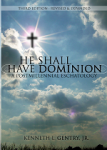
He Shall Have Dominion
(paperback by Kenneth Gentry)
A classic, thorough explanation and defense of postmillennialism (600 pages)
See more study materials at: www.KennethGentry.com
Paul is explaining why believers, though “free from the law of sin and of death” (8:2), still suffer “the whole range of the weakness which characterize us in this life” (Murray, Romans, 1:311), “the whole gamut of suffering, including things such as illness, bereavement, hunger, financial reverses, and death itself” (Moo, Romans, 511). How can this be? Our glory awaits the future “redemption” of the body (8:23) by the Spirit of God (8:11). We are even too weak to pray as we ought, so the Spirit (who resurrects) intercedes for us (8:26–27).
Thus, Paul laments his being in a “mortal body” (Ro 6:12; 8:11), a body subject to corruption and decay (2Co 4:16); he declares that ultimately this “mortality” must put on “immortality” (1Co 15:53–57). We suffer in bodies that are mere “earthen vessels” (2Co 4:7), subject to “bodily illness” (Gal 4:13), “frequent infirmities” (1Ti 5:23), “sickness to the point of death” (Php 1:27). Elders in the church must assist in prayers for healing (Jas 5:17) because sickness is painful and limiting (Gal 4:13), “to the point of death” (Php 1:27) and may even cause death and its bereavement (Jn 11:33; Ac 9:36–37).
Fowler White urges us to understand that “the relationship between the church’s victory and suffering in Romans 8 reflects a theologically fundamental consideration” (White, “Agony, Irony, and Victory,” WTJ, 167). But when we properly analyze the suffering argument, postmillennialists are not confronted with an insurmountable challenge. For postmillennialism does not expect the elimination of mortality this side of the resurrection. And so these sufferings due to mortality will continue even at the height of the advance of the gospel. These should be borne as Christians, not as “the rest who have no hope” (1Th 4:13; cf. Eph 2:12; Jas 1:2–4; Tit 2:7).
We suffer in a world with the principle of evil presentAs regenerate, spiritually (semi-eschatological) resurrected believers, we abhor the sinful tendencies present in ourselves and in others. Paul is torn as he struggles to please God (Ro 7:21–23). He cries out in misery: “Wretched man that I am! Who will set me free from the body of this death?” (Ro 7:24). As Bruce puts it: “Paul himself knows what it means to be torn this way and that by the law of his mind which approves the will of God, and the law of sin and death which pulls the other way. The Christian, in fact, lives in two worlds simultaneously, and so long as this is so he lives in a state of tension” (F. F. Bruce, Romans, 151).
Perilous Times: A Study in Eschatological Evil (by Ken Gentry)
Technical studies on Daniel’s Seventy Weeks, the great tribulation,
Paul’s Man of Sin, and John’s Revelation.
See more study materials at: www.KennethGentry.com
Even at the height of the kingdom’s (postmillennial) advance in the world we will suffer temptation due to “the worry of the world and the deceitfulness of riches” (Mt 13:22). We will always struggle against the “sin which so easily entangles us” (Heb 12:1), the “the lust of the flesh and the lust of the eyes and the boastful pride of life” (1Jn 2:16). Due to our suffering the temptation to sin within, each Christian must follow after Paul, declaring: “I buffet my body and make it my slave” (1Co 9:27; cp. Ro 8:13; Col 3:5).
November 30, 2021
WAS LUKE A LITERALIST?
 PMW 2021-131 by Kenneth L. Gentry, Jr.
PMW 2021-131 by Kenneth L. Gentry, Jr.
Populist dispensationalism is heavily committed to a literalistic hermeneutic. (I do not mean that literally, however: how could an intellectual commitment to a hermeneutic construct be “heavy”? Unless, of course, it is presented in a big book containing either a large number of pages or a small number of extraordinarily thick sheets of paper. But I digress.).
Many dispensationalists argue for a literalistic hermeneutic based on Christ’s first coming. They state that since his first coming was a literal fulfillment of OT prophesy it serves as evidence that all OT prophecy should be interpreted literally. But when we look into the NT, we find that it can present Christ and his enthronement in a spiritual sense, as well. This undercuts the literalism argument in that it shows that prophecies regarding Christ’s first coming are not always and invariably literalistic.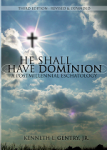
(paperback by Kenneth Gentry)
A classic, thorough explanation and defense of postmillennialism (600+ pages). Complete with several chapters answering specific objections.
See more study materials at: www.KennethGentry.com
For instance, in Acts 2 we find a classic and eschatologically relevant spiritual fulfillment of the OT in the apostolic era. Peter interprets the Davidic kingdom prophecies in general (Ac 2:30) and Psalms 16:8–11 (Ac 2:25–28) and 110:1 (Ac 2:34–35) specifically as being fulfilled in Christ’s ascension and session:
Therefore, being a prophet, and knowing that God had sworn with an oath to him that of the fruit of his body, according to the flesh, He would raise up the Christ to sit on his throne, he, foreseeing this, spoke concerning the resurrection of the Christ, that His soul was not left in Hades, nor did His flesh see corruption. This Jesus God has raised up, of which we are all witnesses. Therefore being exalted to the right hand of God, and having received from the Father the promise of the Holy Spirit, He poured out this which you now see and hear. (Ac 2:30–33)
Here Peter declares that David prophesied the enthronement of Christ when he spoke of his resurrection. The resurrection of Christ begins his state of exaltation, which ends his earthly state of humiliation. And it is the beginning of his kingly enthronement. From Pentecost until the end of history Christ is enthroned and reigning as a king. Jesus is not awaiting a future, literal enthronement in a dispensational millennium. [1]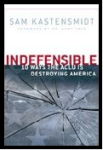
Indefensible (by Sam Kastensmidt)
Sub-title: 10 Ways the ACLU is Destroying America. An Important work in our day of cultural collapse and Christian persecution.
See more study materials at: www.KennethGentry.com
This is the standard exposition of non-premillennial covenant theologians (e.g., Robertson, The Christ of the Covenants, 220–21), as well as non-dispensationalist premillennialists and progressive dispensationalists (e.g., Ladd, Theology of the New Testament, 344).
Later, Paul preaches that Christ’s resurrection fulfills David’s promise to Israel: “And we declare to you glad tidings; that promise which was made to the fathers. God has fulfilled this for us their children, in that He has raised up Jesus. As it is also written in the second Psalm: ‘You are My Son, today I have begotten You.’ And that He raised Him from the dead, no more to return to corruption, He has spoken thus: ‘I will give you the sure mercies of David’” (Ac 13:32–34).
Literalism has difficulties in the kingdom preaching passages in Acts.
Special note
For an important, free, downloadable mp3 sermon on Genesis 2:4-ff click here: What Is the Message of Genesis 2? In this message I show that more was told to Israel of the Creation than we find in Genesis 1 and 2, pointing out that the Creation Account is necessarily a summary account. I also point out that Moses has a moral reason for presenting the Creation account; he is not providing it simply for Israel’s interest. Then I show that Genesis 2:4 is the heading of the following section so that it structurally links Genesis 2 with Genesis 1 and begins the redemptive story of the rest of Genesis and all of Scripture. If liberalism’s attack on Genesis 2 has alarmed you, I recommend listening.
Footnote
As an aside, this passage in Acts 2 led me out of dispensationalism while I was enrolled in Grace Theological Seminary in Winona Lake, Indiana. When I came upon this passage in my research for a class paper, I was startled to see Peter’s point. Not long after this discovery, I left Grace Theological Seminary and transferred to Reformed Theological Seminary in Jackson, Mississippi. There I studied under Greg L. Bahnsen and was startled one more time: this time by his strong affirmation of postmillennialism.

November 26, 2021
AD 70: POINTER TO SECOND ADVENT
 PMT 2014:026 by Kenneth L. Gentry, Jr.
PMT 2014:026 by Kenneth L. Gentry, Jr.
AD 70 prefigures the Second Advent; it is theologically linked to it. But this does not imply any concept of double-fulfillment. There is a fundamental difference between prolepsis and double-fulfillment. Let me explain.
In the OT we have several “Day of the Lord” events: against Babylon (Isa 13:9), Jerusalem (Joel 2:1), and others. Each of these is a pointer to the final Day of the Lord (2 Pet 3:10), though each OT version is spoken of as THE (singular) Day of the Lord. This is much like our spiritual resurrection in salvation (John 5:24-25; 1 John 3:14) pointing to our final resurrection at the end of history. Or like the Christian’s being a “new creation” (2 Cor 5:17; Gal 6:15), which is a picture of the consummate new creation (2 Pet 3:10).
These observations represent standard proleptic theology, which is often called: Now-But-Not-Yet theology. This is held by most evangelical theologians.
In fact, many scholars see AD 70 as a microcosm of the final judgment. Consequently, we may expect the same imagery to apply to both AD 70 and the end.
For instance, of those first-century events, Bloesch states: “The catastrophe that befell the Jewish people in A.D. 70 is a sign of the final judgment.” (Donald G. Bloesch, The Last Things: Resurrection, Judgment, Glory [Downers Grove, Ill: InterVarsity, 2004], 84.)
(by Daniel Doriani)
Presents solid principles and clear examples of biblical interpretation.
See more study materials at: www.KennethGentry.com
Morris agrees: “a theological unity between the two judgments, and that some of what Jesus says [in the Olivet Discourse] could apply equally well to both.” (Leon Morris, The Gospel according to Matthew [Grand Rapids: Eerdmans, 1992], 593.)
Mounce concurs: “the coming destruction of Jerusalem was anticipation of the end of the age.” (Robert H. Mounce, Matthew [Peabody, Mass.: 1991], 222.)
Hagner writes: “The fall of Jerusalem is described in quasi-eschatological language and in the same discourse that describes the coming of the Son of Man. The two events are obviously linked in the minds of the disciples (as their question implied, 24.3) and very probably in the mind of the evangelist.” He continues: “There is a theological relationship between the fall of Jerusalem and the end of the age, since both involve judgment. . . . The former is the prefiguration of the latter.” (Thomas E. Schmidt and Moises Silva, To Tell the Mystery: Essays on New Testament Eschatology in Honor of Robert H. Gundry [Sheffield, Eng.: Continuum, 1994], 66.)
Reymond speaks of Christ’s “‘lesser (typical) coming in judgment’ in the destruction of Jerusalem in A.D. 70.” (Robert L. Reymond, A New Systematic Theology [Nashville: Nelson, 1998], 215.)
Alexander calls AD 70 a “prefiguring,”Robertson “a symbol” of the end. (Joseph Addison Alexander, The Gospel according to Matthew Explained [Lynchburg, Vir.: James Family, rep. n.d., (1861]), 345.)
Greatness of the Great Commission (by Ken Gentry)
An insightful analysis of the full implications of the great commission. Impacts postmillennialism as well as the whole Christian worldview.
See more study materials at: www.KennethGentry.com
Of AD 70, T. J. Geddert states: “the events were, as do so many events in the OT, to point toward the final judgment.” (in Michael B. Green, Scot McKnight, I. Howard Marshal, eds., Dictionary of Jesus and the Gospels: A Compendium of Contemporary Biblical Scholarship [Downers Grove, Ill: InterVarsity, 1992], 23.)
Bavinck sees AD 70 as “the announcement and preparation of the consummation of the world.” (Herman Bavinck, The Last Things: Hope for This World and the Next, trans. by John Vriend, ed. by John Bolt [Grand Rapids: Baker, 1996], 108.)
Strimple as “a proleptic, typological fulfillment of that final judgment of God.” (Robert B. Strimple in Darrell L. Bock, Three Views on the Millennium and Beyond [Grand Rapids: Zondervan, 1999], 64).
In fact, DBI observes that “Scripture portrays God’s judgments throughout history as proleptic pictures of the final judgment.” (Leland Ryken, James C. Wilhoit, Tremper Longman III, eds., Dictionary of Biblical Imagery [Downers Grove, Ill: InterVarsity, 1998], 472.)

November 23, 2021
AMILL OBJECTIONS TO PSALM 2 USE
 PMW 2021-084 by Kenneth L. Gentry, Jr.
PMW 2021-084 by Kenneth L. Gentry, Jr.
An important postmillennial text is Psalm 2. Psalm 2:8 states:
Ask of Me, and I will surely give the nations as Your inheritance, / And the very ends of the earth as Your possession.
An Amillennial Objection
Amillennialists often object to postmillennialism’s use of this verse. They complain that postmillennialists apply the terms ‘nations’ and ‘earth’ in a way that Jesus and the apostles never intended: as political entities. The amillennialist argues that the NT teaches that Christ’s making the nations and the earth his footstool simply refers to the salvation of scattered Gentiles from every tribe tongue and nation, not Christ’s influence on political structures, etc.
The Glory of Christ (book by R. C. Sproul)
From the angels’ revelation of Jesus’ glory to the shepherds outside Bethlehem,
to Jesus’ life-changing revelation of His glory to Paul on the Damascus road, Sproul guides us to a deeper understanding of Christ’s glory.
For more study materials: www.KennethGentry.com
How shall the postmillennialist respond?
First, we must be careful not to throw out all literalism just because dispensationalism wrongly uses it. Literalism may be abused, to be sure. But many verses must be interpreted literally. So charging postmillennialism as a simplistic, naive, dispensational-like eschatology is simply name-calling. I
Second, I don’t see the problem with using Psalm 2:8 as evidence of postmillennialism. That is, I don’t understand what the issue of “political entities”/ “political structures” has anything to do with the amillennial/postmillennial debate here. Even setting aside the idea that particular political entities are in view here, the fact remains that the psalm declares that Christ will make “the nations” (whatever they are) and “the very ends of the earth” his possession. He is not speaking merely of scattered converts here-and-there from out of the nations. Rather he seems clearly to be speaking of vast influence over all the nations and even to the very ends of the earth. The psalm appears to be speaking of some sort of global dominance.
Third, nevertheless, I would note that David does call upon the kings and judges of the earth to do homage to the Son (Psa 2:10-12). It seems he goes to great lengths to speak of not only people in general but even their political rulers and judges.
Fourth, besides all of this, reducing the significance of Psalm 2 would not affect the broader argument for postmillennialism. Postmillennialism is not a “one text” eschatological system (as premillennialism tends to be with Rev 20).[image error]For more information and to order click here.
" data-image-caption="" data-medium-file="https://postmillennialismtoday.files...." data-large-file="https://postmillennialismtoday.files...." class="alignright size-full wp-image-495" src="https://postmillennialismtoday.files...." alt="God Gave Wine Revised" />God Gave Wine (by Ken Gentry)
A biblical defense of moderate alcohol consumption. Considers all key biblical passages and engages the leading objections.
See more study materials at: www.KennethGentry.com
November 19, 2021
1 JOHN 2:2 BY B. B. WARFIELD (3)
 “Jesus Christ the Propitiation for the Whole World” (3)
“Jesus Christ the Propitiation for the Whole World” (3)
PMW 2021-083 by Benjamin B. Warfield
[Gentry note: This is part 3 of an excellent article by renowned postmillennial Princeton scholar, B. B. Warfield.]
The Meaning of “Propitiation”
The expedient made use of by many commentators in their endeavor to escape from this maze of contradictions is to distinguish between Christ as our “Advocate” and Christ as our “Propitiation,” and to connect actual salvation with him only in the former function. Thus Richard Rothe tells us that “the propitiation in Christ concerns the whole world,” but “only those in Christ have an advocate in Christ,” with the intimation that it is Christ’s advocacy which “makes the efficacy of his propitiation effective before God.” In this view the propitiation is conceived as merely laying a basis for actual forgiveness of sins, and is spoken of therefore rather as “sufficient” than efficacious—becoming efficacious only through the act of faith on the part of the believer by which he secures Christ as his Advocate. This is the view presented by B. F. Westcott also, according to whom Christ is advocate exclusively for Christians, while he is a propitiation for the whole world. His propitiatory death on earth was for all men; his advocacy in heaven is for those only who believe in him. Here, there is a universal atonement taught, with a limited application, contingent on actual faith: “the efficacy of his work for the individual depends upon fellowship with him.”
It is obvious that such a view can be held only at the cost of emptying the conception of propitiation of its properly expiatory content, and shifting the really saving operation of Christ from his “atoning” death on earth to his “intercession” in heaven. Westcott carries out this whole program fully, and by a special doctrine of “sacrifice,” of “blood” and its efficacy, and of “the heavenly High Priesthood of Christ” systematizes this point of view into a definite scheme of doctrine. No support is given this elaborate construction by John; and our present passage is enough to shatter the foundation on which it is built, in common with many other constructions sharing with it the general notion that the atonement is to be conceived as universal while its application is particular, and that we may therefore speak of the sins of the whole world as expiated while believers only enjoy the benefits of this expiation.
He Shall Have Dominion
(paperback by Kenneth Gentry)
A classic, thorough explanation and defense of postmillennialism (600+ pages). Complete with several chapters answering specific objections.
See more study materials at: www.KennethGentry.com
The “advocacy” of our Lord is indeed based on his propitiation. But it is based on it not as if it bore merely an accidental relation to it, and might or might not, at will, follow on it; but as its natural and indeed necessary issue. John introduces the declaration that Christ is—not “was,” the propitiation is as continuous in its effect as the advocacy—our propitiation, in order to support his reference of sinning Christians to Christ as their Advocate with the Father, and give them confidence in the efficacy of his advocacy. The efficacy of the advocacy rests on that of the propitiation not the efficacy of the propitiation on that of the advocacy. It was in the propitiatory death of Christ that John finds Christ’s saving work: the advocacy is only its continuation—its unceasing presentation in heaven.
The propitiation accordingly not merely lays a foundation for a saving operation, to follow or not follow as circumstances may determine. It itself saves. And this saving work is common to Christians and “the whole world.” By it the sins of the one as of the other are expiated, that is to say, as Weiss wishes to express it in Old Testament forms of speech, are “covered in the sight of God.” They no longer exist for God—and are not they blessed whose iniquities are forgiven, and whose sins are covered, to whom the Lord will not reckon sin? It is idle to talk of expounding this passage until we are ready to recognize that according to its express assertion the “whole world” is saved. Its fundamental assumption is that all those for whose sins he is—is, not “was”—the propitiation have in him an Advocate with the Father, prevailingly presenting his “righteousness” to the Father and thereby securing their salvation.
The Question of Universalism
This is, of course, universalism. And it is in determining the precise nature of the universalism that it is, that we arrive at last at John’s real meaning. In declaring that Jesus Christ is a propitiation for the whole world, John certainly does not mean to assert that Christ has made expiation for all the sins of every individual man who has come or will come into being, from the beginning of the race in Adam to its end at the last day.
Baumgarten-Crusius seems to stand almost alone in expressly emphasizing the protensive aspect of the “world”; and he does it in order to avoid admitting that John means to present Christ as the Savior of the whole world extensively considered. John means only, he says, that Christ is a Savior with abiding power for the whole human era; all through the ages he is mighty to save, though he saves only his own. It is much more common silently to assume that by “the whole world” John has in mind the whole race of mankind throughout the entire range of its existence in time: few have the hardihood openly to assert it. It is ordinarily taken for granted (Huther is one of the few who give it explicit expression) that “John was thinking directly of the ‘world’ as it existed in his time.” Huther indeed adds the words: “without however limiting the idea to it,” and thus suggests that John was thinking of the “world” protensively as well as extensively, without explicitly saying so. Clearly in any event it would be impossible to attribute to John teaching to the effect that Christ’s expiatory work concerned only those who happened to be living in his own—or John’s —generation. This would yield a conception of the range of the propitiatory efficacy of our Lord’s death which can be looked upon only as grotesque.
Lord of the Saved
(by Ken Gentry)
A critique of easy believism and affirmation of Lordship salvation. Shows the necessity of true, repentant faith to salvation.
See more study materials at: www.KennethGentry.com
Yet there is nothing in John’s language to justify the attribution to him of a protensive conception of “the whole world” in the sense of the universalists. It seems quite clear that, by “the whole world,” he means primarily the world extensively conceived. It is equally clear, however, that he means neither to confine the efficacy of Christ’s blood to his own generation, nor to maintain that the entirety of contemporary humanity was saved. He knew of those not of his own time who were saved; he knew of children of the devil in his own day. There is a protensive element in his conception of the word. It is however of its protension in the future rather than in the past that he is thinking. He sees the world not only lying on every side of him in space, but very especially as stretching out before him in time. The contrast between it and the little flock of Christians includes thus a contrast of times.
The interpretation of our passage has suffered seriously from a mechanical treatment of its language. We must permit to John the flexibility customary among men in the handling of human speech. When be speaks of Christ as a propitiation “for the whole world,” we cannot either confine his language rigidly to the world of his own day, or expand it with equal rigidity to the extremest limit of the possible connotation of the phrase. He is certainly intending to present Christ as a world-wide Savior by whom nothing less than the world is saved; but it does not follow that he means to affirm that therefore no single man of all who ever live in the world is omitted. He is obviously thinking in the terms of the great phrase he is himself a little later to use, when he declares that the Father has sent the Son “as Savior of the world.” To him Jesus Christ is very expressly the Savior of the whole world: he had come into the world to save not individuals merely, out of the world, but the world itself. It belongs therefore distinctly to his mission that he should take away the sin of the world. It is this great conception which John is reflecting in the phrase, “he is the propitiation for our sins, and not for ours only but for the whole world.”
This must not be diluted into the notion that he came to offer salvation to the world, or to do his part toward the salvation of the world, or to lay such a basis for salvation that it is the world’s fault if it is not saved. John’s thinking does not run on such lines; and what he actually says is something very different, namely that Jesus Christ is a propitiation for the whole world, that he has expiated the whole world’s sins. He came into the world because of love of the world, in order that he might save the world, and he actually saves the world. Where the expositors have gone astray is in not perceiving that this salvation of the world was not conceived by John—any more than the salvation of the individual—accomplishing itself all at once. Jesus came to save the world, and the world will through him be saved; at the end of the day he will have a saved world to present to his father. John’s mind is running forward to the completion of his saving work; and he is speaking of his Lord from the point of view of this completed work. From that point of view he is the Savior of the world.
Conceptions like those embodied in the Parables of the Mustard Seed and the Leaven lay at the back of John’s mind. He perfectly understood that the Church as it was phenomenally present to his observation was but “a little flock.” He as perfectly understood that it was after a while to cover the whole world. And therefore he proclaims Jesus the Savior of the world and declares him a propitiation for the whole world. He is a universalist; he teaches the salvation of the whole world. But he is not an “each and every” universalist he is an eschatological” universalist. He teaches the salvation of the world through a process; it may be— it has proved to be— a long process; but it is a process which shall reach its goal. It is not then “our” sins only which Jesus has expiated—the sins of the “little flock,” now living within the range almost of John’s physical vision. He has expiated also the sins of “the whole world”; and at the end, therefore we shall be nothing less than a world saved by him. The contrast between the “our” and “the world” in John’s mind, therefore, is at bottom the contrast between the smallness of the beginnings and the greatness of the end of the Christian development.
And what his declaration is, at its core, is thus only another of those numerous —prophecies, shall we say? or assertions?—which meet us throughout the apostolic teaching, of the ultimate conquest of the world by Christ. Christ, he tells his “little flock,” is the “propitiation for our sins”; in him “we” have found a full salvation. But he is not willing to stop there. His glad eyes look out on a saved world. “And not for ours only,” he adds, “but also for the whole world.” We are a “little flock” now: tomorrow we shall be the world. We are but the beginnings: the salvation of the world is the end. And it is not this only, but that, that Christ has purchased with his precious blood. The light that is perceptible now only within the narrow limits of the “little flock” has in it a potency of illumination which no bounds can confine: it, “the real light,” is “already shining”—and before it John sees “the darkness” already “passing away.”
It is not merely a world-wide gospel with which he knows himself entrusted: it is a world-wide salvation which he is called to proclaim. For Jesus Christ is the Savior not of a little flock merely, but of the world itself: and the end to which all things are working together is nothing other than a saved world. At the end of the day there will stand out in the sight of all a whole world, for the sins of which Christ’s blood has made effective expiation, and for which he stands as Advocate before the Father.
November 16, 2021
1 JOHN 2:2 BY B. B. WARFIELD (2)
 “Jesus Christ the Propitiation for the Whole World” (2)
“Jesus Christ the Propitiation for the Whole World” (2)
PMT 2021-082 by Benjamin B. Warfield
[Gentry note: This is part 2 of an excellent article by renowned postmillennial Princeton scholar, B. B. Warfield.]
“And he is the propitiation for our sins; and not for ours only, but also for the whole world.”
(1 John 2:2)
The Problem of “the World”
The search for John’s meaning naturally begins with an attempt to ascertain what he intends by “the world.” He sets it in contrast with an “our” by which primarily his readers and himself are designated: “And he is himself a propitiation for our sins, and not for ours only but for the whole world.” John’s readers apparently are immediately certain Christian communities in Asia Minor; and it is possible to confine the “our” strictly to them. In that case it is not impossible to interpret “the whole world,” which is brought into contrast with the Christians specifically of Asia Minor, as referring to the whole body of Christians extended throughout the world.
A certain measure of support for such an interpretation may be derived from such a passage as Colossians 1:6, where “the word of the truth of the gospel” is spoken of as “in all the world,” or as Colossians 1:23, where the gospel is said to have been “preached in all creation under heaven.” In these passages the world-wide gospel seems to be contrasted with the heresies which were troubling the Colossian Christians and which are thus branded as a merely local phenomenon. In something of the same way, the world-wide extension of the people of God may be thought to be brought into contrast by John with the local churches he is addressing; and his purpose may be supposed to be to remind these local churches that they have no monopoly of the gospel. The propitiatory efficiency of Christ’s blood is not confined to the sins of the Asian Christians, but is broad enough to meet the needs of all in like case with them through-out the whole world. Christ is no local Savior, and all, everywhere, who confess their sins will find him their righteous advocate, whose expiatory blood cleanses them from every sin. On this interpretation we are brought to much the same point of view as that of Augustine and Bede, of Calvin and Beza, who understand by “the whole world” “the churches of the elect dispersed through the whole world”; and by the declaration that Jesus Christ is “a propitiation for the whole world,” that in his blood all the sins of all believers throughout the world are expiated.[image error]For more information and to order click here.
" data-image-caption="" data-medium-file="https://postmillennialismtoday.files...." data-large-file="https://postmillennialismtoday.files...." class="alignright size-thumbnail wp-image-254" src="https://postmillennialismtoday.files...." alt="When Shall These Things Be? A Reformed Response to Hyperpreterism" width="95" height="150" />When Shall These Things Be? A Reformed Response to Hyperpreterism
(ed. by Keith Mathison)
A reformed response to the aberrant HyperPreterist theolgy.
Gentry’s chapter critiques HyperPreterism from an historical and creedal perspective.
See more study materials at: www.KennethGentry.com
When the assumptions on which this view of the passage is founded are scrutinized, however, they cannot be said particularly to commend themselves. John is certainly addressing a specific body of readers, and no doubt has them quite distinctively in mind when he speaks to them in the tender words, “My little children, I am writing this to you, that ye sin not.” But the affirmations he makes do not seem to be affirmations applicable only to them, or to be intended to be understood as spoken only of them. This is already apparent from his identifying himself with them in these affirmations. “We have an Advocate,” he says; “he is a propitiation for our sins, and not for ours only.” If it is not impossible that he means only “you and I,” “for your and my,” with the strictest confinement of the “you” and “your” to those he was immediately addressing, it is nevertheless very unlikely that this is the case.
He appears, on the contrary, to be reminding them of universal Christian privileges, in which they and he shared precisely for the reason that they were universally Christian. In that case the “we” and “our” refer to the whole Christian community—“we Christians” have “our, namely Christians’” sins; and “the whole world” is brought in some way into contrast with the Christian body as a whole. The strength of the assertion of universality in the contrasted phrase—“but also for the whole world”—falls in with this appearance. Why should the Apostle with such emphasis— why should he at all— assure his readers that the privileges they enjoyed as Christians—in common with him because they were both Christians— were also enjoyed by all other Christians,—by all other Christians throughout the whole world? Would it not be a matter of course, scarcely calling for such explicit assertion, that other Christians like themselves enjoyed the benefits of the expiatory death of their Lord? That was precisely what it was to be a Christian.
It is not surprising accordingly that the greater number of the commentators agree that the “we” of our passage is the whole body of believers, with which “the whole world” is set in contrast. That carries with it, of course, that in some sense our Lord is declared to have made propitiation not only for the sins of believers, thought of by John as actually such, but also for mankind at large. If we do not attempt the impossible feat of emptying the conception of “propitiation” of its content, this means that in some sense what is called a “universal atonement” is taught in this passage. The expiatory efficiency of Christ’s blood extends to the entire race of mankind. It may seem, then, the simplest thing just to recognize that John here represents Christ as by his atoning death expiating all the sins of all mankind— all of them without exception. This is the line of exposition which is taken, for instance, by Bernhard Weiss. “Precisely this passage shows plainly,” he writes, “that the whole body of the world’s sin is covered in the sight of God, that is to say expiated, by the death of Christ.”
That this method of expounding the passage is not so simple, however, as it might at first sight appear, is already made clear enough by the remainder of the sentence in which Weiss gives expression to it. It runs: “What brings unbelievers to death is no longer their sin (expiated in the death of Christ), but their rejection of the divinely appointed mediator of salvation.” From this it appears that the expiation of the sins of the world does not save the world. There still remain those who perish: and those who perish, as John contemplated them looking out from the bosom of the little flock of the Church, constituted the immensely greater part of mankind spread out to his view, in one word just “the world” of which he is in the act of declaring that its sins are expiated in the blood of Christ. John speaks of this expiation as a great benefit brought to the world by Christ, or, to put it in its true light, as the great benefit, in comparison with which no other benefit deserves consideration.
Amillennialism v. Postmillennialism Debate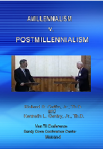
(DVD by Gentry and Gaffin)
Formal, public debate between Dr. Richard Gaffin (Westminster Theological Seminary)
and Kenneth Gentry at the Van Til Conference in Maryland.
See more study materials at: www.KennethGentry.com
Yet it would puzzle us to point out of what benefit it is to the world. The world, to all appearance, remains precisely as it was before. It is very clear that the world was not conceived by John as a redeemed world. We are not to love it, nor the things in it. We are rather to renounce it, as an inimical power. Nay, John declares roundly that the whole world—this whole world which we are invited to think of as having had all its sins expiated by the blood of Christ—“lieth in the evil one.” It is difficult to understand how a world all whose sins have been, and are continually as they emerge being—for that is the force of the representation—washed away in the blood of Christ, can still be lying in the evil one; that is to say, as A. Plummer expounds this declaration, still “remains in the power” of the evil one, “has not passed over, as Christians have done, out of death into life; but abides in the evil one, who is its ruler, as the Christian abides in Christ.” What we are asked to believe is nothing less than that the John who places the world and Christian in directly contrary relations to Christ, nevertheless in our present passage places them in precisely the same relation in Christ.
Nor is it easy to understand what can be meant by saying that men, all whose sins, as they occasionally emerge (“and he is,” not was, “a propitiation”) are covered from the sight of God by the death of Christ, nevertheless perish; and that because of rejection of the divinely appointed mediator of salvation. Is not the rejection of Jesus as our propitiation a sin? And if it is a sin, is it not like other sins, covered by the death of Christ? If this great sin is excepted from the expiatory efficacy of Christ’s blood, why did not John tell us so, instead of declaring without qualification that Jesus Christ is the propitiation for our sins, and not for ours only but for the whole world? And surely it would be very odd if the sin of rejection of the Redeemer were the only condemning sin, in a world the vast majority of the dwellers in which have never heard of this Redeemer, and nevertheless perish. On what ground do they perish, all their sins having been expiated?
(To be continued)
November 12, 2021
1 JOHN 2:2 BY B. B. WARFIELD (1)
 “Jesus Christ the Propitiation for the Whole World” (1)
“Jesus Christ the Propitiation for the Whole World” (1)
PMW 2021-083 by Benjamin B. Warfield
[Gentry note: This is an excellent article by renowned postmillennial Princeton scholar, B. B. Warfield.]
“And he is the propitiation for our sins; and not for ours only, but also for the whole world.”
(1 John 2:2)
As a means of comforting Christians distressed by their continued lapses into sin, John, in the opening words of the second chapter of his first Epistle, is led to assure them that “we have an Advocate with the Father, Jesus Christ, a Righteous One”; and by way of showing how prevailing his advocacy is, to add, “And he is himself a propitiation for our sins.” There he might well have stopped. But, without obvious necessity for his immediate purpose, he adds this great declaration: “And not for ours only, but also for the whole world.” That by these words the propitiation wrought by Christ, of which we have continual need, and on which we continually draw in our need, is exalted by ascribing to it, in some sense, a universal efficacy, is clear enough. But the commentators, first and last, have not found it easy to make plain to themselves the precise nature of the universalism assigned therein to our Lord’s propitiatory sacrifice.
Difficulties for Commentators
Readers of old John Cotton’s practical notes on First John, for example, will not fail to observe that he moves with a certain embarrassment in his exposition of this universalism. He has a number of things, in themselves of value, to say about it; but he appears to find most satisfaction in the suggestion that although Christ by his expiatory death has bought for his people some things—and these the most important things—which he has not bought for all men, yet there are some most desirable things also which he has bought for all men. This, however, is certainly not what John says. It admits of no doubt that John means to say that the Christians whom he was addressing, and with whom he identifies himself—they and he alike—enjoy no privilege with reference to the propitiation of Christ, which is not enjoyed by them in common with “the whole world.” They—and he with them—are not to be disheartened by their sins, he says, because these sins have been expiated by the blood of Christ; by which have been expiated indeed, not their sins only but also those of “the whole world.” The “whole world” is not made in some general and subsidiary sense a beneficiary of Christ’s atoning death, but in this specific and highest sense — the expiation of its sins. Its sins have been as really and fully expiated as those of the Christians John was addressing, and as his own.
Thine Is the Kingdom
(ed. by Ken Gentry)
Contributors lay the scriptural foundation for a biblically-based, hope-filled postmillennial eschatology, while showing what it means to be postmillennial in the real world.
See more study materials at: www.KennethGentry.com
The most “modern” of modern expositors are as much at sea in the face of the universalism of this assertion as any of the older and presumably less instructed ones could be. Thus Otto Baumgarten simply declines to attempt its exposition. We do not know what John means, he says; we lack the necessary information to enable us to understand him. It may sound very fine to say that John teaches here that no shadow is cast on God’s holiness by the exhibition of partiality on his part for individuals; that he rebukes those who, in egotistic and sentimental religiosity, or in selfish anxiety for their own salvation, would draw apart from their fellows.
But difficulties remain. Experience scarcely encourages us to think that all without exception are sharers in Christ’s salvation; it rather bears out our Lord’s declaration that the gate is narrow and the way straitened that leads to life and few there be that find it. And John! Is not the whole world to him a massa corrupta—a “darkness” which does not “apprehend” “the light”? How we can harmonize the three passages— John 1:29, which speaks of taking away the sin of the world; John 3:16, “God so loved the world”; and this, declaring that Christ has made propitiation for the sins of the world—with John’s sharp dualism of Light and Darkness, does not appear.
Three Views on the Millennium and Beyond
(ed. by Darrell Bock)
Presents three views on the millennium: progressive dispensationalist, amillennialist, and reconstructionist postmillennialist viewpoints. Includes separate responses to each view.
See more study materials at: www.KennethGentry.com
Perhaps John is only repeating with thoughtless neglect of their inconsequence the elements of Paul’s doctrine of propitiation. Perhaps, mystical-speculative thinker that he is, he means to suggest that in Jesus’ purpose or general feeling his redemption was for the whole sinful world, but only those have found in him an actual Redeemer or Intercessor to whom he has given power to become Children of the Light. Perhaps it is, on the other hand, the missionary instinct of the Church, which declares here that no limits are to be set to the spread of salvation over the whole world—in contrast to the Gnostic confinement of it to certain gifted individuals. We can form many conjectures; we can reach no assurance.
(To be continued)
November 2, 2021
CAN A LIBERAL BE POSTMILLENNIAL?
 PMW 2021-080 by Kenneth L. Gentry, Jr.
PMW 2021-080 by Kenneth L. Gentry, Jr.
As I note on my “Definition” page on this blogsite, postmillennialism confidently anticipates a time in earth history (continuous with the present) in which the very gospel already operating will win the victory throughout the earth, fulfilling the Great Commission. “The thing that distinguishes the biblical postmillennialist, then, from amillennialists and premillennialists is his belief that the Scripture teaches the success of the great commission in this age of the church” (Greg L. Bahnsen, Victory in Jesus, 74).
Thus, we hold that the overwhelming majority of men and nations will be Christianized, righteousness will abound, wars will cease, and prosperity and safety will flourish. “It will be marked by the universal reception of the true religion, and unlimited subjection to the sceptre of Christ.” “It shall be a time of universal peace.” “It will be characterised by great temporal prosperity” (David Brown, Christ’s Second Coming, 399, 401). This causes us to “look forward to a great ‘golden age’ of spiritual prosperity continuing for centuries, or even for millenniums, during which time Christianity shall be triumphant over all the earth” (Lorraine Boettner, The Millennium, 29).
Because of such optimism, we often hear the charge that postmillennialism is basically a liberal, social gospel approach to biblical prophecy. The postmillennialist must respond to the this specious charge. A practical way of doing this is asking the opponent to define what postmillennialism teaches. Oftentimes he cannot do it. So, you must define it for him.
In the process you should note that by definition postmillennialism cannot be liberal. Note what the word “postmillennial” itself means. Basically it means that Christ with Return post (after) the millennium. Now ask the objector: What liberal believes Christ will return at all? This charge has not been thought through at the most basic level of definition.
Thankfully, amillennialist Robert Strimple has accepted my argument that postmillennialism by definition cannot be equated with liberalism: “I express appreciation for Pastor Gentry’s attempt to establish his postmillennial eschatology on a biblical basis. Surely he has laid to rest the charge (too often heard in the past) that the kind of evangelical postmillennialism he advocates rests on liberal, humanist, evolutionist presuppositions.” See: Strimple in Bock, Three Views on the Millennium and Beyond (Zondervan), p. 58.
One of our biggest challenges as postmillennialists is to educate Christians. The Christian needs to be challenged with the true definition of postmillennialism so that he can be given the biblical argument for this glorious hope. In a later blog article I will respond to the confused argument of dispensationalist Thomas D. Ice against postmillennialism He makes the astounding, simplistic, unthinking assertion:
“The greatest problem with postmillennialism is the fact that the Bible just does not teach it. Where is a specific passage that teaches the postmillennial concept? Not a passage that they think it their best, from which they attempt to develop a postmillennial theology. I am asking for a passage that teaches the idea of postmillennialism. It is nowhere to be found in the Bible. Lack of specific biblical support is fatal to postmillennialism for any Bible believing Christian.” (From the “Rapture Ready” website. Since the rapture has been expected for 2000 years, you would think this would be a very old site, but it is not.)
Unfortunately, the lawyer’s maxim holds true in the dispensationalist debate with postmillennialists: “If you can’t pound the facts, pound the table.” The dispensational naivete is such that by going around and saying the there is not single passage of Scripture that teaches postmillennialism one can persuade the simple. And sadly, the church today is full of simple people. As atheist Bertrand Russell once charged: “Christians would rather die than think. In fact, they do.”
A good place to start the education process is with a book designed for that very purpose: Postmillennialism Made Easy.
Postmillennialism Made Easy (by Ken Gentry)
Basic introduction to postmillennialism with response to leading objections.
See more study materials at: www.KennethGentry.com
Kenneth L. Gentry Jr.'s Blog
- Kenneth L. Gentry Jr.'s profile
- 85 followers




